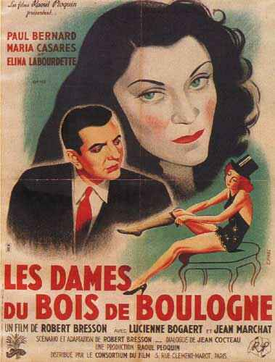Pages
▼
Tuesday, June 6, 2017
Les Dames du Bois de Boulogne (Robert Bresson, 1945)
I doubt that I would have recognized Les Dames du Bois de Boulogne as a film by Robert Bresson if I hadn't already known it was the second feature film of his career. Its milieu, the haute bourgeoisie, is far removed from the priests, peasants, pickpockets, and prison escapees of his great later films, which also relied on non-professional actors instead of the established professionals of this film. There is even a rather lush score by Jean-Jacques Grünewald, instead of the reliance on ambient sound characteristic of the more familiar period. Clearly, something happened to Bresson's aesthetic in the six years that separate Les Dames du Bois de Boulogne from Diary of a Country Priest (1951). And yet there's something in the restraint with which Bresson films this updating of a story by Denis Diderot and in the clarity of moral vision with which he imbues it that keeps it "Bressonian." Diderot's 18th-century story is of an age with Choderlos de Laclos's Les Liasons Dangereuses, which has been filmed half a dozen times, including versions updated to the 20th century by Roger Vadim (1959) and Roger Kumble (Cruel Intentions, 1999). Diderot's and Laclos's stories both turn on the failure of the best-laid plans of vengeful lovers: Erotic obsession becomes a two-edged sword. With the help of Jean Cocteau's dialogue and well-judged performances by Maria Casares, Paul Bernard, and Elina Labourdette, Bresson maintains the tension of withheld revelations throughout the narrative in which Hélène (Casares) manipulates her former lover Jean (Bernard) into marrying Agnès (Labourdette), who is not the "impeccable" woman Hélène deceives Jean into believing her to be. The dénouement, in which Jean, having learned the truth, finds himself trapped inside his own automobile, is brilliantly staged. And even the bittersweet sort-of-happy ending feels right, if only because Bresson has revealed the inescapable cruelty of the milieu in which it takes place. I suspect that even if Bresson had gone on in this vein, rather than carving out for himself his unique place in film history, he would still be regarded as an important filmmaker.
Charles Matthews
